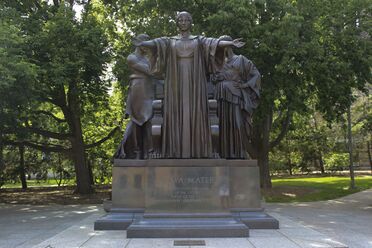Social:Alumnus

An alumnus (masculine) or an alumna (feminine) of a college, university, or other school is a former student who has either attended or graduated in some fashion from the institution. The word is Latin and means "one who is being (or has been) nourished". The plural is alumni for men and mixed groups and alumnae for women. The term is not synonymous with "graduate"; one can be an alumnus without graduating (Burt Reynolds, alumnus but not graduate of Florida State, is an example). The term is sometimes used to refer to a former employee or member of an organization, contributor, or inmate.[1][2][3]
| alumnus | alumna | alumni | alumnae | |
|---|---|---|---|---|
| English | /əˈlʌmnəs/ ə-LUM-nəs |
/əˈlʌmnə/ -nə |
/əˈlʌmnaɪ/ -nye |
/əˈlʌmniː/ -nee, also US: /-naɪ/ -nye |
| Latin (Classical) | [aˈlʊmnʊs] | [aˈlʊmna] | [aˈlʊmniː] | [aˈlʊmnae̯] |
| Latin (Ecclesiastical) | [aˈlumnus] | [aˈlumna] | [aˈlumni] | [aˈlumne] |
Etymology
The Latin noun alumnus means "foster son" or "pupil". It is derived from PIE *h₂el- (grow, nourish), and it is a variant of the Latin verb alere "to nourish".[6] Separate, but from the same root, is the adjective almus "nourishing", found in the phrase Alma Mater, a title for a person's home university.
In Latin, alumnus is a legal term (Roman law) to describe a child placed in fosterage.[7] According to John Boswell, the word "is nowhere defined in relation to status, privilege, or obligation."[8] Citing the research of Henri Leclercq, Teresa Nani, and Beryl Rawson, who studied the many inscriptions about alumni, Boswell concluded that it referred to exposed children who were taken into a household where they were "regarded as somewhere between an heir and a slave, partaking in different ways of both categories." Despite the warmth of feelings between the parent and child, "an alumnus might be treated both as a beloved child and as a household servant."[9]
Usage
An alumnus or alumna is a former student and most often a graduate of an educational institution (school, college, university).[10] According to the United States Department of Education, the term alumnae is used in conjunction with either women's colleges[11] or a female group of students. The term alumni is used in conjunction with either men's colleges, a male group of students, or a mixed group of students:
In accordance with the rules of grammar governing the inflexion of nouns in the Romance languages, the masculine plural alumni is correctly used for groups composed of both sexes: the alumni of Princeton University.[12]
The term is sometimes informally shortened to "alum" (optional plural "alums").[13]
Alumni reunions are popular events at many institutions. They are usually organized by alumni associations and are often social occasions for fundraising.
See also
References
- ↑ "The State Of Corporate Alumni : 2017 Survey Results" (in en-US). EnterpriseAlumni - Large Organization Alumni & Retiree Management. 2017-10-02. https://enterprisealumni.com/2017-corporate-alumni-survey/.
- ↑ "Alumni – Definition from the Free Merriam Webster Dictionary". Merriam-webster.com. 2010-08-13. http://www.merriam-webster.com/dictionary/alumni. "1: A person who has attended or has graduated from a particular school, college, or university. 2: a person who is a former member, employee, contributor, or inmate"
- ↑ "Alumnus – definition of alumnus by Macmillan dictionary". Macmillandictionary.com. http://www.macmillandictionary.com/dictionary/british/alumnus. "Someone who was a student at a particular school, college, or university"
- ↑ Collins English Dictionary (13th ed.). HarperCollins. 2018. ISBN 0-008-28437-7.
- ↑ "Alumna". Merriam-Webster Dictionary. https://www.merriam-webster.com/dictionary/alumna. Retrieved 2022-05-15.
- ↑ Merriam-Webster: alumnus...
- ↑ For example, Digest 40, 2, 14
- ↑ Boswell 1988, pp. 116.
- ↑ Boswell 1988, pp. 117–119.
- ↑ The American Heritage Dictionary of the English Language
- ↑ "Archived: Women's Colleges in the United States: History, Issues, and Challenges". Ed.gov. http://www.ed.gov/offices/OERI/PLLI/webreprt.html.
- ↑ "alumni – Definitions from Dictionary.com". Dictionary.reference.com. http://dictionary.reference.com/browse/alumni.
- ↑ "alum." Dictionary.com Unabridged (v 1.0.1). Based on the Random House Unabridged Dictionary, © Random House, Inc. 2006. 1 December 2006. Dictionary.com http://dictionary.reference.com/browse/alum
Bibliography
- Boswell, John (1988). The Kindness of Strangers:The Abandonment of Children in Western Europe from Late Antiquity to the Renaissance. New York: Pantheon. ISBN 9780226067124.
External links
